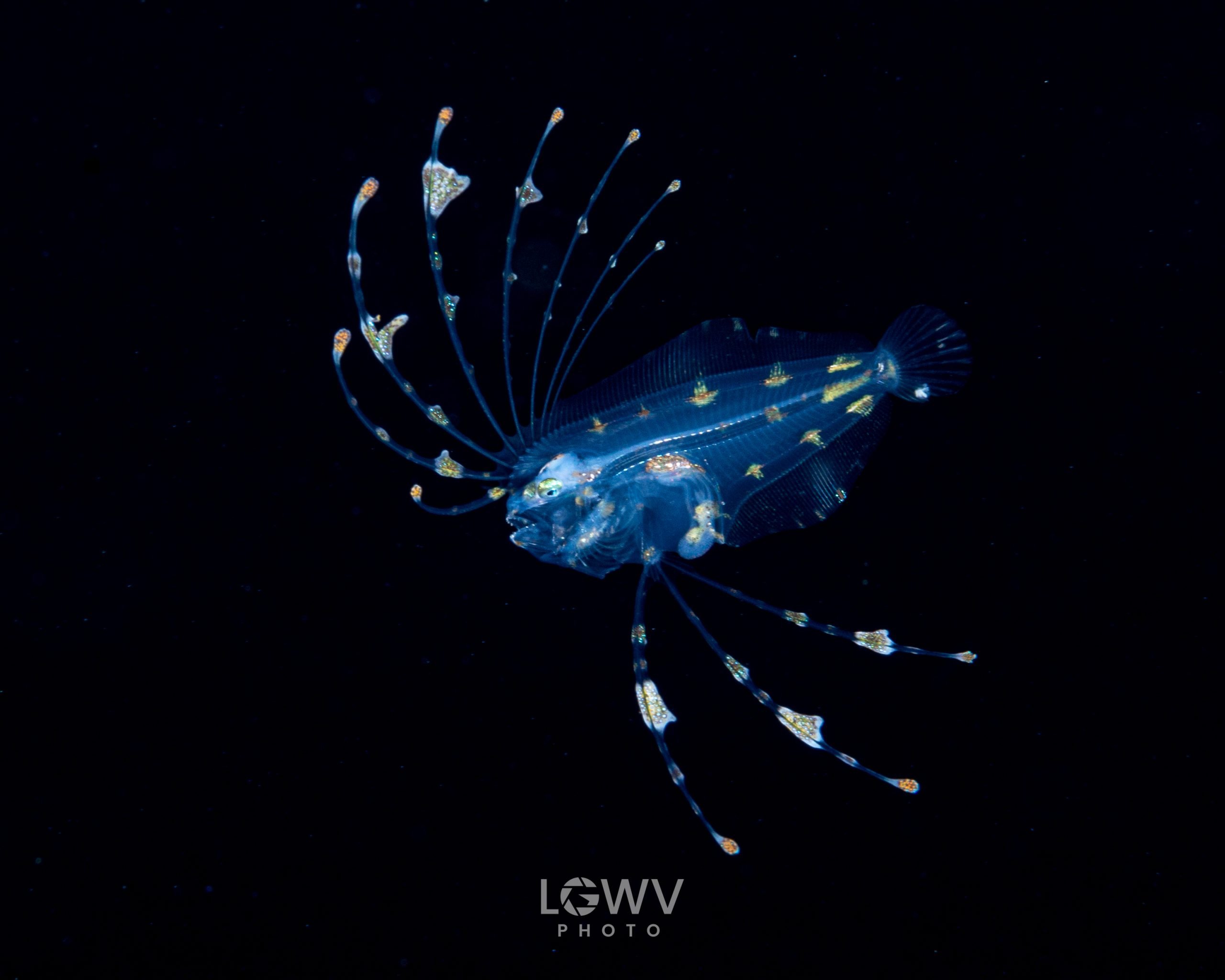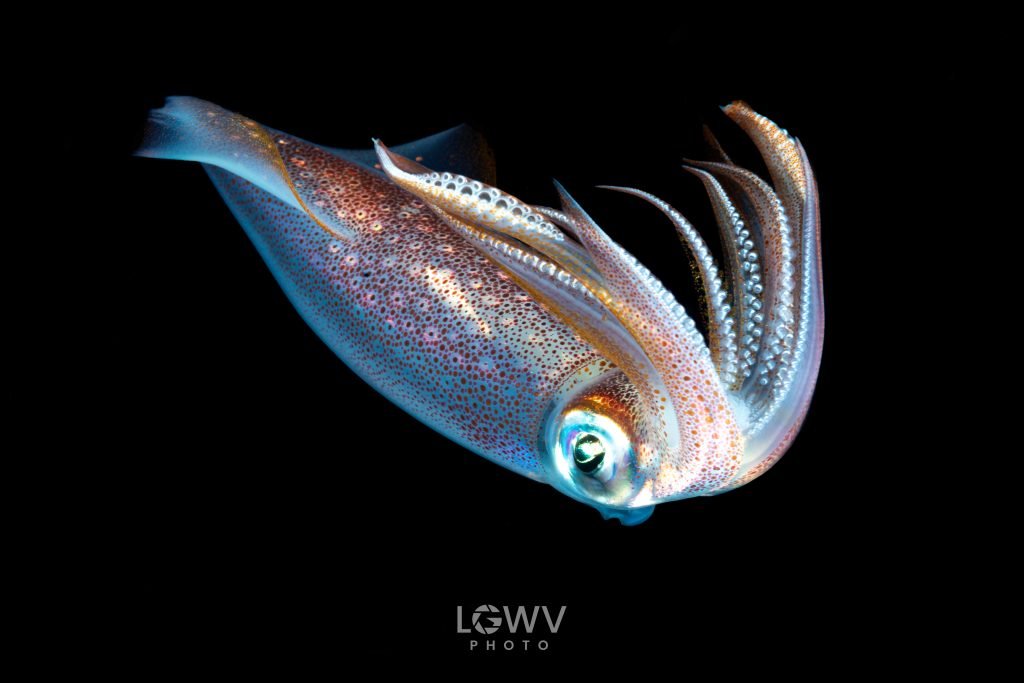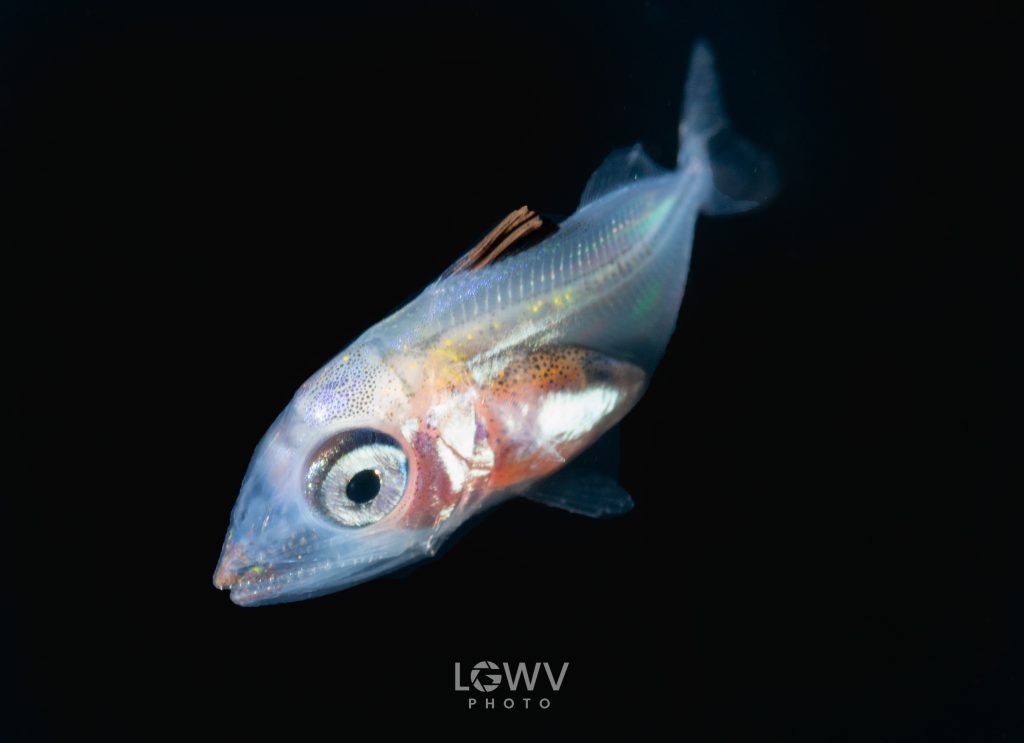What is Blackwater Diving?

Attention, new scuba divers! If you’re ready to embark on an adventure like no other, let’s explore the intriguing world of blackwater diving. This unique type of dive takes place in the depths of darkness, where the open water becomes your playground.

Used by permission
What is a Blackwater Dive?
Blackwater diving is an adventure that usually takes divers far enough offshore so that the lights from shore do not affect the underwater experience. Down here in Palm Beach County, FL, the boats usually take you 45 minutes to an hour off-shore. This put you right in the Gulfstream. Some people get worried at this point because the bottom is 700 ft down. Don’t worry, we aren’t going near that. Blackwater divers have a tendency to be more shallower dives of 20-60 ft depth.
While the boat is not out of sight of land, it is far enough so that the light pollution from land is not visible underwater. However long it takes your boat to get into position, the wait is well worth it. Blackwater diving offers a completely different perspective of the world beneath the waves.
While it is true that blackwater diving is a type of night diving, the two terms are not synonymous. Night diving typically refers to diving after sunset at sites nearer to shore. Dive sites like the Blue Heron Bridge that are closer to shore are considered “night diving”. Blackwater diving is a wholly different experience.
Here in South Florida, we do drift diving during the day. Blackwater diving is no different, it’s a drift dive. If you are doing blackwater diving in an area that doesn’t ahve a strong current, the experience may be a little different. The basics are the same though.
The first thing that happens is that the deckhand drops a string of lights into the water. These aren’t just small dive lights, this is a 50′ line with around 20-30 large dive lights on it. This serves to give divers a point of reference while in the water.
As divers exit the boat and start to descend, they begin to spread out from the line of lights but never to the point where they can’t see it. As divers arrive at their desired depth, usually between 20-60 feet down, turn their back to the line. This cuts out most of the light from the line and divers eyes can adjust to the darkness the world comes alive. As they begin to turn on their lights, they begin to focus not on the macro life as in a normal dive, but the small micro life surrounding them.
Unlike other scuba dives, the point is not to see the bottom and the life that resides there. The point is to examine the life that lives in different strata of the ocean. Some divers never descend more than 20 feet below the surface. Other divers explore the 30-60 foot strata. A few divers with the appropriate certification may explore the 60-100 foot strata. Each ocean stratum has different life in it; you can do many black water dives and still be discovering new things.

Used by permission
Why Do a Blackwater Dive?
For many divers, a blackwater dive is a bucket list dive. Indeed, the surreal encounters blackwater offers provide lasting memories, but the experience can be overwhelming for some. They opt for the solace of more familiar grounds, content with a single glimpse into the abyss. Blackwater diving’s alluring blend of beauty and photographic potential attracts enthusiastic divers. Within this environment, capturing images requires patience and experience. However, the results can be truly rewarding.
Beyond the realm of photography, these dives offer much more. They are unique opportunities for exploration, allowing divers to delve into the ocean’s intricate ecosystem. Plunging into this enigmatic realm presents an extraordinary chance to observe and study the myriad marine life that emerges under the cover of night. Divers plunge into the blackwater, revealing a hidden realm teeming with fascinating life. This experience provides the opportunity to witness rare sightings and firsthand encounters with unique behaviors, creating an unforgettable and enlightening adventure.
What Additional Equipment is Necessary?
To embark on a blackwater dive, certain specialized equipment is required. Transitioning from typical daytime dives to the darkness of the deep requires careful preparation.
- Dive Lights
Illuminate the darkness with powerful dive lights to enhance visibility and capture the mesmerizing details of marine life. Uncle Cal’s Dive Club newsletter members get an entire edition dedicated to what to look for in a dive torch. The bottom line is you need 2. You don’t want to be caught in a blackwater dive and have your light go out for any reason. Always carry a backup. - Camera and Housing
If you plan on exploring the world of underwater photography on your blackwater dive, a reliable underwater camera is essential. It allows you to capture the unique and captivating moments during these extraordinary dives. - Magnifying Glass
Even if you are carrying a camera, I would recommend all divers carry a magnifying glass. A magnifying glass will let you examine the small life around them. If you go with the one I link to, I would recommend you drill a hole near the end and thread a lanyard through it so you can attach it to your wrist. Remember, you are in water too deep to retrieve dropped objects.
Beyond that, make sure that you have all the normal scuba diving gear. Make sure and check that everything is properly functioning before you get on the boat.
By having the right equipment and being familiar with its use, you enhance your blackwater diving experience. Make the most of this extraordinary underwater adventure.
Who Should Do A Blackwater Dive?
Blackwater diving is a special diving adventure that’s best left for experienced underwater explorers. Even though it doesn’t need a deep diving certificate, it’s still an advanced type of diving. One thing that makes it extra challenging is that most divers do it alone, not with a buddy like usual. Sure, there are other divers around, but the way they spread out underwater can make things a bit confusing, especially if you’re new to diving. This might make some new divers feel worried and uneasy, and that’s not a great way to enjoy your dive.
The thing about blackwater diving is that it’s not quite the same as the regular diving you might be used to. It’s like diving into a big, dark ocean world yourself. This can be pretty cool for experienced divers who are used to it, but it might be a lot to handle if you’re just starting out. Feeling all alone down there can make you feel nervous, and that can take away from the fun of seeing all the fantastic underwater stuff. So, if you’re thinking about trying blackwater diving, it’s a good idea to make sure you’re comfortable with diving and have some experience under your belt. It’s all about having a good time and enjoying the underwater sights, and you want to make sure you’re ready for that kind of adventure!
Wrap Up
Blackwater diving is an adventure that delivers rewards for those who dare to explore. Blackwater dives offer a unique and exciting way to witness the wonders of the underwater world like never before. By immersing yourself in the depths of the ocean during the nighttime, you embark on an extraordinary journey of discovery.
The allure of blackwater diving lies in its ability to unveil a hidden realm teeming with life and mystery. As you descend into the dark depths, you are greeted by a mesmerizing display of marine creatures that are rarely seen during daylight dives. From graceful jellyfish and bioluminescent organisms to delicate seahorses and elusive deep-sea dwellers, the underwater world reveals its secrets in the darkness.
This exceptional diving experience goes beyond the thrill of exploration. It allows you to deepen your understanding of the marine ecosystem and witness the intricate interconnectedness of its inhabitants. Through blackwater diving, you gain a newfound appreciation for the resilience and adaptability of marine life, as they navigate the challenges of the deep-sea environment. It is an opportunity to connect with the ocean on a profound level and become part of its fascinating story.

Join Our Mailing List For New Scuba Divers
If you like this tip for new scuba divers, join our mailing list. You’ll get a new tip delivered to your inbox each week. Learn to dive confidently!
Header photograph copyright Lawrence G Watkins All Rights Reserved
Used by permission